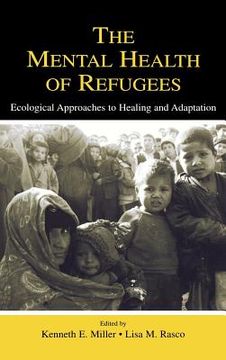Synopsis "the mental health of refugees: ecological approaches to healing and adaptation"
It is estimated that at least 33 million people around the world have been displaced from their homes by war or persecution. Numerous studies have documented high rates of psychological distress among these survivors of extreme violence and forced migration, yet very few have access to clinic-based mental health care. In any case, clinic-based services cannot adequately address the constellation of displacement-related stressors that affect refugees daily, whether in a new region of their homeland or a new country--stressors such as social isolation, the loss of previously valued social roles, poverty and a lack of employment opportunities, and difficulties obtaining education and medical care. Additionally, many refugees from non-western societies find western methods of psychiatric and psychological healing culturally alien or stigmatizing, and therefore underutilize such services. This book brings together an international group of experts on the mental health of refugees who have pioneered a new approach to healing the psychological wounds of war and forced migration. Their work is guided by an ecological model, which, in contrast to the prevailing medical model of psychiatry and clinical psychology, emphasizes the development of culturally grounded mental health interventions in non-stigmatized community settings. The ecological model also prioritizes synergy with natural community resources to promote adaptation, prevention over treatment, the active involvement of community members in all phases of the intervention process, and the empowerment of marginalized communities to address their own mental health needs. Drawing on their expertise in community psychology, prevention science, anthropology, social psychology, social psychiatry, public health and child development, the authors present a variety of highly innovative, culturally grounded interventions designed to improve the mental health and psychosocial well-being of communities that have survived the nightmares of political repression, civil war, and genocide. They discuss the various conceptions of well-being and distress that have informed their projects, their own integrations of western and indigenous approaches to understanding and relieving psychological distress, and in several instances their creative use of well-trained paraprofessionals. They examine with remarkable candor the challenges they have faced in carrying out their work in extraordinarily demanding conditions. An extended introductory chapter reviews and analyzes what we know about the impact of political violence and exile on mental health, and lays out the ecological model in rich theoretical and empirical context. The first of two concluding chapters addresses the critical and often-neglected issue of the evaluation of community-based interventions in conflict and post-conflict settings; the second sums up the implications of the achievements and limitations of the programs described, poses questions that must be answered, such as "How adequate is the PTSD construct in capturing the nature of refugee trauma?", and suggests numerous directions for future research and practice. The Mental Health of Refugees: Ecological Approaches to Healing and Adaptation is an essential reference for all professionals who seek to serve members of this vulnerable population, for those who train and supervise them, and for program administrators and policymakers concerned with refugee well-being. It is also an excellent resource for graduate courses in public mental health, community psychology and psychiatry, refugee and immigrant studies, psychological trauma, medical anthropology, and ethnopolitical violence.

